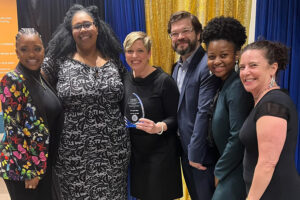The Legal Clinic at UT Law
In a clinical course at the College of Law Legal Clinic, students find opportunities to build an experiential bridge between law school and practice by representing real clients facing real legal issues.
Students operate as practitioners in a public interest law firm and are immersed in all facets of their case and project work, collaborating closely with clinical faculty to ensure proper and complete representation. The curriculum allows students time for critical review and reflection as they evaluate their own work and the legal work of their classmates.
Students deepen their legal knowledge, strengthen their lawyering skills, and grow their professional experience through our legal clinics. Our clinical faculty guide, mentor, and challenge students while also assisting them in gaining expertise in clinical scholarship.
We are a national leader in clinical education, ranking 11th in U.S. News and World Report’s top legal clinical programs among public universities.
The Legal Clinic at UT Law
In a clinical course at the College of Law Legal Clinic, students find opportunities to build an experiential bridge between law school and practice by representing real clients facing real legal issues.
Students operate as practitioners in a public interest law firm and are immersed in all facets of their case and project work, collaborating closely with clinical faculty to ensure proper and complete representation. The curriculum allows students time for critical review and reflection as they evaluate their own work and the legal work of their classmates.
Students deepen their legal knowledge, strengthen their lawyering skills, and grow their professional experience through our legal clinics. Our clinical faculty guide, mentor, and challenge students while also assisting them in gaining expertise in clinical scholarship.
We are a national leader in clinical education, ranking 11th in U.S. News and World Report’s top legal clinical programs among public universities.
Our Clinics
The Advocacy Clinic is the longest-running legal clinic in the United States and remains one of the most successful programs of its kind.
In this clinic, students represent their own clients in various types of legal disputes involving criminal, housing, and juvenile law. Under Tennessee’s Student Practice Rule, students who have reached their fourth semester of law school, are allowed to represent clients under the supervision of faculty members. Client representation requires students to engage in the full range of lawyer duties, beginning with client interviews and proceeding through factual investigation, case development, negotiation, and often on to hearings or trial. Thus students, develop a wide range of lawyering skills, including:
– fact investigation
– client interviewing and counseling
– witness interviewing
– developing of case strategy, theme, and theory
– drafting and arguing pretrial motions
– trial preparation and presentation
– negotiating with opposing parties
– developing and exercising professional judgment
The Advocacy Clinic functions like a law firm, with the entire “firm” meeting weekly with clinic faculty and guest speakers to discuss cases, tactics, applicable law and strategy.
Law students working in the Domestic Violence Clinic represent actual clients in contested hearings and trials in Knox County’s Fourth Circuit Court. Students represent victims of domestic violence in gaining and enforcing orders of protection and in related matters.
In addition to appearing in court, students meet weekly as a firm with their faculty supervisor. In order to participate in the Domestic Violence Clinic, students must have taken Legal Profession or be currently enrolled. The three-credit, one-semester course is offered in the fall and spring semesters.
Partnership with the College of Social Work
The Domestic Violence Clinic partners with the UT College of Social Work to place an intern from the Master of Science in Social Work program in the Domestic Violence Clinic. Through this partnership, the Domestic Violence Clinic and the College of Social Work collaborate to address the multiple needs of clients who are domestic violence victims.
The Expungement Mini-Clinic focuses on one of the most significant criminal reentry issues facing people who have been arrested for a crime – cleaning up a person’s criminal record.
Students assist clients with Tennessee’s complex expungement process from conducting the initial interview to preparing the expungement petition. The course integrates statutory interpretation, lawyering skills and ethics through an in-depth study of Tennessee’s expungement statutes, related caselaw and rules of professional conduct. Students build their skills in interviewing, counseling and advocacy through in-class discussions, simulations and interactions with clients.
The Expungement Mini Clinic is a one-credit hour course.
Students in the Family Law Mediation Clinic focus on mediation process, theory, strategy, tactics and skills while mediating family law disputes. The students study and develop mediation skills through readings and simulations and by serving as mediators in the Knox County Juvenile Court and other settings. Participation in the clinic satisfies the Tennessee Supreme Court Rule 31 training requirements for certification as a family law mediator.
Students must have taken Legal Profession to participate in the Family Mediation Clinic.
Students in the Mediation Clinic have the opportunity to acquire and enhance skills as mediators in actual legal disputes in the Knox County General Sessions Court and other settings.
Through partnerships with experienced volunteers. clinic students co-mediate cases that may involve landlord–tenant, services or property damage disputes.
The clinic works closely with the Community Mediation Center and the East Tennessee mediation community to promote the use of mediation as an alternative dispute resolution process and to provide training and professional development opportunities for community mediators, as well as UT Law students. In the clinic, students observe experienced mediators in specialized subject areas like divorce and custody, employment discrimination, and workers’ compensation. Completion of the clinic satisfies Tennessee Supreme Court Rule 31’s training requirements for certification as a general civil mediator, a benefit that is valuable to students seeking to enhance their professional credentials.
Students in the Mediation Clinic must have taken Legal Profession and also must take Law and Community Improvement while they are taking the Mediation Clinic. The clinic combined with the Law and Community Improvement class is a six-credit course.
Students will learn transactional legal skills through the representation of small businesses, nonprofit organizations, community-based associations, entrepreneurs, and artists.
Through supervised fieldwork, student attorneys will assume primary responsibility for representing clients with various non-litigation matters. Such matters might include:
– providing advice regarding legal entity choice and forming the entity
– identifying state and local business licensing and permitting requirements
– providing advice regarding tax-exempt status
– drafting governance documents
– negotiating and drafting contracts
– advising entities on employment and independent contractor arrangements
– assisting with trademark and copyright registration
The Transactional Law Clinic provides a valuable service to the community while giving students the unique opportunity to acquire skills, training, and experience essential to representing clients in transactional matters and which are transferable to virtually any practice area.
The Transactional Law Clinic participates in the Law School Certification Program of the United States Patent and Trademark office. Students provide trademark legal services to clients on a pro bono basis, and represent those clients before the USPTO.
Students must have taken Business Associations, and must have taken or be taking Professional Responsibility and Contract Drafting to participate in the Transactional Law Clinic. The Transactional Law Clinic is a six-credit course, offered during the fall and spring semesters.
Students in the Homer A. Jones, Jr. Wills Clinic represent economically disadvantaged clients in estate planning and uncontested young-adult conservatorships. Students interview clients to evaluate their legal needs then draft and execute relevant documents, including wills, living wills, and trusts.
The clinic is offered as a four-credit, one-semester course, offered during the fall and spring semesters.
Our Specializations
The Advocacy Clinic is the longest-running legal clinic in the United States and remains one of the most successful programs of its kind.
In this clinic, students represent their own clients in various types of legal disputes involving criminal, housing, and juvenile law. Under Tennessee’s Student Practice Rule, students who have reached their fourth semester of law school, are allowed to represent clients under the supervision of faculty members. Client representation requires students to engage in the full range of lawyer duties, beginning with client interviews and proceeding through factual investigation, case development, negotiation, and often on to hearings or trial. Thus students, develop a wide range of lawyering skills, including:
- – fact investigation
- – client interviewing and counseling
- – witness interviewing
- – developing of case strategy, theme, and theory
– drafting and arguing pretrial motions
– trial preparation and presentation
– negotiating with opposing parties
– developing and exercising professional judgment
The Advocacy Clinic functions like a law firm, with the entire “firm” meeting weekly with clinic faculty and guest speakers to discuss cases, tactics, applicable law and strategy.
The Advocacy Clinic is a six-credit course, offered fall and spring semesters, and occasionally during summer semesters. Students who wish to enroll in the Advocacy Clinic must have taken Evidence and must either have taken or be taking Legal Profession.
The Appellate Litigation Clinic, established in 2014, enables students to develop their appellate litigation skills, including:
– researching and analyzing legal issues
– constructing a coherent and effective narrative
– drafting clear and concise legal arguments
– writing analytically and persuasively
– editing and proofreading a written product
– preparing and presenting a clear and persuasive oral argument
Students in the Appellate Litigation Clinic have argued filed briefs and argue successfully in administrative proceedings and in appellate courts, including the Tennessee Supreme Court.
The Appellate Litigation Clinic is a year-long six-credit course. Students who wish to enroll in the Appellate Litigation Clinic must have taken Evidence and must either have taken or be taking Legal Profession.
In the Business Law Clinic, third-year law students, working under the close supervision of a full-time law professor with vast transactional experience, represent the business clients. Students in the clinic have the unique opportunity to acquire skills, training, and experience essential to working successfully with business clients and thus, to bridge the gap between law school and the practice of law.
The Business Law Clinic is modeled after the structure of a transactional law firm and provides legal advice to business owners in the following critical areas:
– Business planning
– Entity selection and registration
– State and local business licenses
– Federal, state, and local tax issues
– Financing documentation and securities issues
– Leases and other commercial contracts
– Employment agreements
– Trademark and copyright registration, IP licensing agreements, and material transfer and non-disclosure agreements
– IP counseling regarding branding, copyrights, trademarks, trade secrets, freedom to operate, unfair competition, antitrust, publicity rights, and privacy rights
Through this model, the Business Law Clinic, in conjunction with the Anderson Center for Entrepreneurship and Innovation, is one of the cornerstones of the innovation ecosystem in the Knoxville area.
Students must have taken Fundamental Concepts of Income Taxation, Intro to Business Transactions, Business Associations, and Income Taxation of Business Organizations and must have taken or be taking Legal Profession and Contract Drafting to participate in the Business Law Clinic, although Intro to Business Transactions may be waived for students with sufficient business background. The Business Law Clinic is a six-credit course, offered during the fall and spring semesters.
Trademark
As part of the college’s Business Clinic, students in the Trademark Clinic provides trademark legal services to independent inventors and small businesses on a pro bono basis. Students represent clients before the U.S. Department of Commerce’s U.S. Patent and Trademark Office under the guidance of a faculty supervisor experienced in trademark matters.
Students in the Community Economic Development Clinic provide a valuable service to the community while developing skills essential to the ins and outs of business law practice. Students will interact with local, state, and federal agencies on behalf of their clients; draft contracts and governance documents; conduct regulatory research and provide compliance advice; and give legal presentations to the community.
The clinic handles transactional legal issues for nonprofits, artists, and non-scalable businesses, such as sole proprietorships.
Law students working in the Domestic Violence Clinic represent actual clients in contested hearings and trials in Knox County’s Fourth Circuit Court. Students represent victims of domestic violence in gaining and enforcing orders of protection and in related matters.
In addition to appearing in court, students meet weekly as a firm with their faculty supervisor, Jo Ann Lehberger, who served as a family court judge for 13 years and worked as a family law attorney for more than 20 years.
In order to participate in the Domestic Violence Clinic, students must have taken Legal Profession or be currently enrolled. The three-credit, one-semester course is offered in the fall and spring semesters.
Partnership with the College of Social Work
The Domestic Violence Clinic partners with the UT College of Social Work as a result of a generous gift from Lee Ann Tolsma and John T. Tolsma. The College of Social Work places an intern from the Master of Science in Social Work program in the Domestic Violence Clinic. Through this partnership, the Domestic Violence Clinic and the College of Social Work collaborate to address the multiple needs of clients who are domestic violence victims.
Students in the Expungement Mini Clinic assist individuals in expunging charges from their juvenile or adult criminal records. Students gain valuable experience working within a statutory framework, identifying expungable charges and convictions, and providing a meaningful service to those in need of legal assistance.
The Expungement Mini Clinic is a one-credit hour course.
Students in the Mediation Clinic have the opportunity to acquire and enhance skills as mediators in “live client” disputes in the Knox County General Sessions Court and during scheduled appearances in other forums. The Mediation Clinic has trained more than 150 mediators since its creation in 1993 by UT professor Grayfred Gray, a venerated mediator who was one of the pioneers of the mediation movement in Tennessee.
Partnering with the Knox County Community Mediation Center, clinic students co-mediate cases with experienced volunteers. Many of these cases, filed in the Knox County General Sessions Court, involve landlord–tenant, services, and property damage disputes. By providing mediation services to low-income and other legally underserved groups, the Mediation Clinic provides a valuable community service.
The clinic works closely with the Community Mediation Center and the East Tennessee mediation community to promote the use of mediation as an alternative dispute resolution process and to provide training and professional development opportunities for community mediators, as well as UT Law students. In the clinic, students observe experienced mediators in specialized subject areas like divorce and custody, employment discrimination, and workers’ compensation. Completion of the clinic satisfies Tennessee Supreme Court Rule 31’s training requirements for certification as a general civil mediator, a benefit that is valuable to students seeking to enhance their professional credentials.
Students in the Mediation Clinic must have taken Legal Profession and also must take Law and Community Improvement while they are taking the Mediation Clinic. The clinic combined with the Law and Community Improvement class is a six-credit course.
Family Mediation
Students in the Family Mediation Clinic focus on mediation process, theory, strategy, tactics, and skills while mediating family law disputes. The students study and develop mediation skills through readings and simulations and by serving as mediators in the Knox County Juvenile Court and other settings. Participation in the clinic satisfies the Tennessee Supreme Court Rule 31 training requirements for certification as a family law mediator.
Students must have taken Legal Profession to participate in the Family Mediation Clinic.
Students in the Homer A. Jones, Jr. Wills Clinic represent economically disadvantaged clients in trust and estate matters. Students in the Wills Clinic interview clients, ascertain their legal needs, and draft and execute relevant documents, including wills, living wills, and trusts). The students also may handle probate matters. The clinic was established with a grant from the American College of Trust and Estate Counsel (ACTEC) Foundation. Continued support comes from an endowment begun with a generous gift from Homer A. Jones, Jr., an ACTEC fellow who practiced in Bristol, Tenn.
The clinic is offered as a three-credit, one-semester course, offered during the fall and spring semesters.
Clinic News

UT College of Law ranked among top programs by U.S. News
In the newly released 2024 U.S. News & World Report Best Law Schools rankings, the University of Tennessee College of Law continued to be ranked

UT Legal Clinic Honored for Extraordinary Community Service
This fall, the Legal Clinic at the University of Tennessee College of Law was recognized by both the Knoxville Branch of the NAACP and Legal

Tennessee Supreme Court Justice Sharon Lee Celebrated with Bernstein-Ritchie Award
A little before 9 a.m. on Saturday, April 21, 2018, Tennessee Supreme Court Justice Sharon Lee (UT Law ’78) entered the First Baptist Church of
Contact Us
UT Legal Clinic
1505 W. Cumberland Ave.
Knoxville, Tennessee 37996
Phone: 865-974-2331
Office: Suite 83
Email: legalclinic@utk.edu
Contact Us
UT Legal Clinic
1505 W. Cumberland Ave.
Knoxville, Tennessee 37996
Phone: 865-974-2331
Office: Suite 83
E-mail: legalclinic@utk.edu
